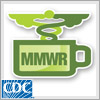A CUP OF HEALTH WITH CDC
Avoiding Childhood Obesity
Obesity Among Low-Income, Preschool-Aged Children — New York City and
Los Angeles County, 2003-2011
Recorded: January 22, 2013; posted: January 24, 2013
[Announcer] This program is presented by the Centers for Disease Control and Prevention.
[Dr. Gaynes] Welcome to A Cup of Health with CDC, a weekly feature of the MMWR, the Morbidity and Mortality Weekly Report. I’m your host, Dr. Robert Gaynes.
Maintaining a healthy weight in childhood can prevent many health-related problems later in life.
Dr. Jackson Sekhobo is an epidemiologist with the New York State Department of Health. He’s joining us by telephone today to discuss the importance of avoiding obesity in childhood. Welcome to the show, Jackson.
[Dr. Sekhobo] Thank you for having me on the show, Bob.
[Dr. Gaynes] Jackson, define obesity in children.
[Dr. Sekhobo] Obesity in children refers to a weight category that is above 95 percent of the weights of children of similar age and gender, after taking into consideration their height.
[Dr. Gaynes] Jackson, how big of a problem is obesity among children?
[Dr. Sekhobo] At present, Bob, childhood obesity affects 17 percent, or 2.5 million children between the ages of two and 19 years old. Preschool age children, that is, children from ages zero to five years, who are obese, are more likely to be obese as teenagers and as young adults.
[Dr. Gaynes] What health problems can be caused by being obese?
[Dr. Sekhobo] Being obese can increase the risk of type two diabetes, high blood pressure, and high blood cholesterol. All of these conditions, in turn, can increase the risk of heart disease. In addition, being obese can lead to asthma and sleep apnea, as well as social discrimination, which can affect self-esteem during childhood and adulthood.
[Dr. Gaynes] How can children achieve and maintain a healthy weight?
[Dr. Sekhobo] Bob, there’re several ways for achieving and maintaining a healthy weight among children. First, children should be breast fed from birth through at least the first six months of life. Second, as children grow, their consumption of sweetened beverages and non-nutritious snacks should be limited. They should be offered and encouraged to drink more water, instead. Third, they should also be offered more healthy snacks and foods, such as low-fat milk, lots of fruit and vegetables, both at home and at day care or school. Next, children should engage in regular physical activity for at least 60 minutes a day. And finally, their screen or TV time should be limited to no more than two hours a day.
[Dr. Gaynes] At what point should a parent consult a health care provider about their child’s weight?
[Dr. Sekhobo] Beginning immediately after birth, parents should monitor their children’s weight on an ongoing basis and in partnership with their health care providers. In addition, parents and caregivers should seek information from their health care providers regarding stages of growth and development when young children may briefly put on more weight ahead of a growth spurt so they do not get unnecessarily alarmed.
[Dr. Gaynes] Jackson, where can listeners get more information about obesity in children?
[Dr. Sekhobo] The CDC website has the most comprehensive information on childhood obesity. Parents can go to cdc.gov and in the search box, they can type ‘childhood obesity.’
[Dr. Gaynes] Thanks, Jackson. I’ve been talking today with Dr. Jackson Sekhobo about obesity in children.
Remember, maintaining a healthy weight and avoiding obesity in childhood can prevent many health-related problems later in life.
Parents - engage in physical activity with your children as early as possible and serve meals and snacks that include lots of fruits and vegetables, lean meats, and low-fat milk.
Until next time, be well. This is Dr. Robert Gaynes for A Cup of Health with CDC.
[Announcer] For the most accurate health information, visit www.cdc.gov or call 1-800-CDC-INFO.



